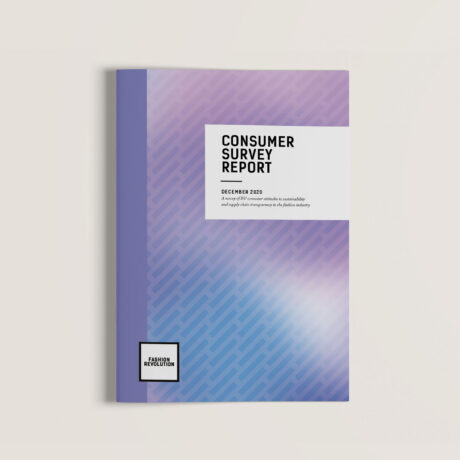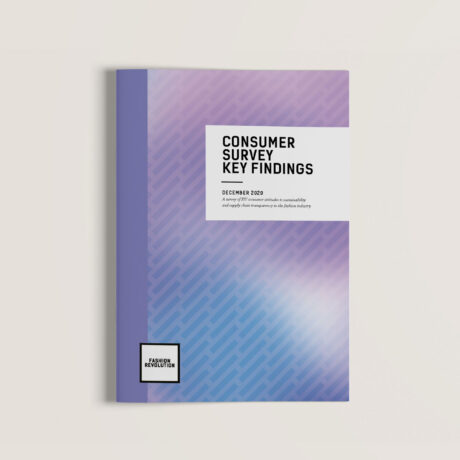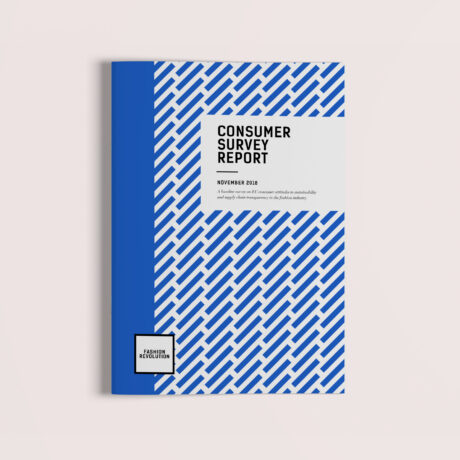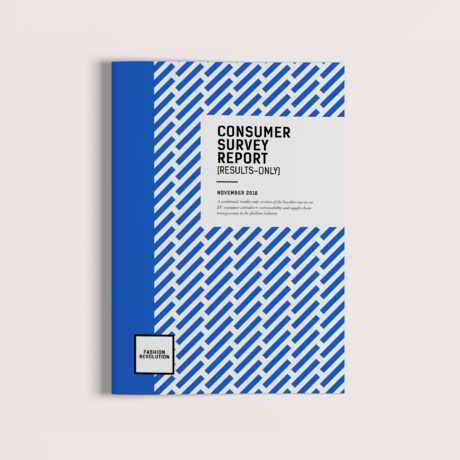Consumer Survey
In 2020, Fashion Revolution commissioned a survey of 5,000 people aged 16-75 in the five largest European markets, including Germany, France, Italy, Spain and the United Kingdom, to find out how supply chain transparency and sustainability impacts EU consumers’ purchasing decisions when shopping for clothing, accessories and shoes.
DOWNLOAD THE REPORT

Fashion Revolution Consumer Survey 2020
Download Now
Fashion Revolution Consumer Survey 2020 - Key Findings
Download Now
Fashion Revolution Consumer Survey 2018
Download Now
Fashion Revolution Consumer Survey 2018 (Results Only)
Download NowABOUT THE SURVEY
We conducted our first ever consumer survey in 2018 among people aged 16-75 in the five largest European markets – Germany, France, Italy, Spain and the UK. In August 2020, a follow-up survey was carried out in the same countries to learn about their shopping behaviour in the last twelve months and current views on some of fashion’s most pressing social and environmental issues.
The research aimed to discover what information consumers would like fashion brands to share when it comes to social and environmental impacts and to better understand what roles consumers think that governments and laws should play in ensuring clothing is sustainably produced.
This survey is part of Trade Fair, Live Fair,’ a 3-year project funded by the European Commission that brings together 35 partners from the Fair Trade community across the EU to raise public awareness and contribute to achieving Goal 12.8 of the UN’s Sustainable Development framework: “ to ensure that, by 2030, people everywhere have the relevant information and awareness for sustainable development and lifestyles in harmony with nature”.
KEY FINDINGS
Consumers are calling on fashion brands and governments to ensure transparency and respect for human rights and the environment along supply chains.
75% of people agreed that fashion brands should do more to improve the lives of the women making their clothes, up from 72% in 2018.
69% of people would like to know how their clothes were manufactured, in comparison to 59% in 2018
Consumers agreed that governments have a role to play in ensuring clothing is produced sustainably (70%)
The majority of people wear their clothes for at least a few years and pass on unwanted clothes to others to use, but fewer say they avoid buying new clothes and repair their damaged clothes.
62% of people say they wear their clothes for at least a few years. When you compare countries, interestingly, this is the case for 71% of Brits compared to just 39% of Italians.
Meanwhile, 8% of people aged 16-24 say they only wear clothes that are ‘in fashion’ compared to 4% of respondents across all countries.
53% of people pass on their unwanted clothes to others for reuse, with 62% of women compared to 44% of men saying they do this.
Washing at 30°C or lower can dramatically reduce the carbon footprint of our clothes, yet less than half of respondents (40%) do this.
People want to buy clothes made without harming the environment, animals, workers or consumers.
37% of respondents said it’s important that the clothing they buy is produced without using harmful chemicals for the consumer.
Buying clothes made without harming animals was important for 29% of respondents, with 34% of women compared to 24% of men.
The majority of people think it is important that fashion brands have ethical (72%) and sustainability (80%) certifications.
In the last 12 months, more consumers have tried to purchase clothes at a reduced price in the sale than those that have tried to purchase clothing made in an environmentally or socially responsible way.
39% of respondents said they tried to buy clothes in a sale.
19% of people have tried to buy clothing made in an environmentally responsible way.
Only 14% of people tried to purchase second-hand clothing instead of new.
31% of people have tried to purchase clothes that are designed for durability
WHAT NEXT?
Fashion Revolution will use this research to inspire consumers, companies and governments to each play their role in driving long-term industry-wide change towards a fairer, safer, cleaner and more transparent future of the fashion industry.

